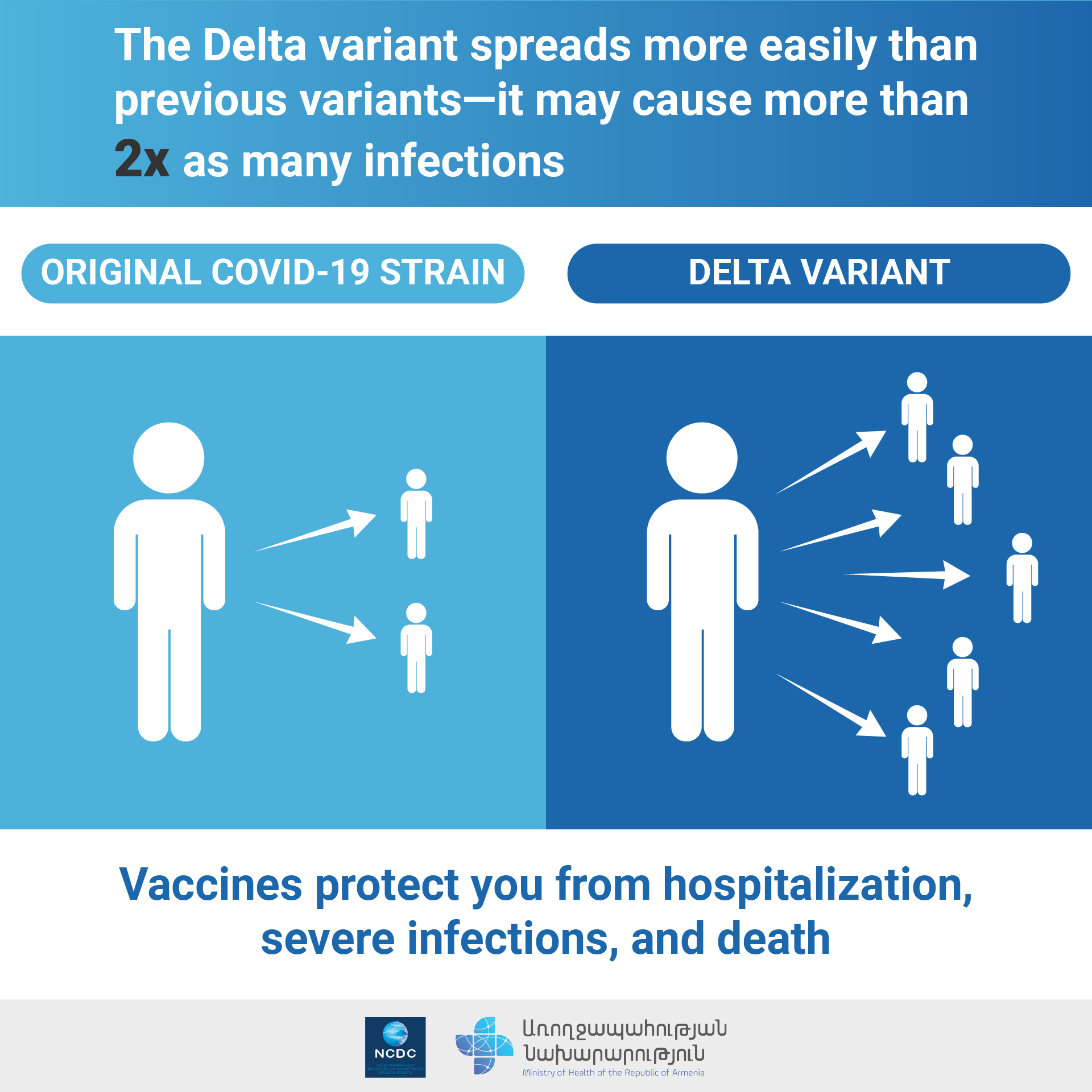COVID-19 variants
What You Need to Know about COVID-19 Variants
 Viruses constantly change through mutation, and new variants of a virus are expected to occur. Sometimes new variants emerge and disappear. Other times, new variants persist. Numerous variants of the virus that causes COVID-19 are being tracked globally during this pandemic1.
Viruses constantly change through mutation, and new variants of a virus are expected to occur. Sometimes new variants emerge and disappear. Other times, new variants persist. Numerous variants of the virus that causes COVID-19 are being tracked globally during this pandemic1.
Top Things You Need to Know
1. Variants are expected. The best way to slow the emergence of new variants is to reduce the spread of infection by taking measures to protect yourself, including getting a COVID-19 vaccine when available.
2. Vaccines keep you from getting very sick, hospitalized, or dying from COVID-19.
3. All COVID-19 tests can detect all variants, but they will not tell you which variant you have.
 Vaccines
Vaccines
• Authorized COVID-19 vaccines (hyperlink to “Vaccine types explained” page) protect against Delta and other known variants.
• These vaccines effectively keep people from getting COVID-19, getting very sick, and dying.
 Symptoms
Symptoms
• Most variants cause similar COVID-19 symptoms. (hyperlink to Symptoms page)
• Some variants may cause more people to get even sicker and die, for example, Alpha and Delta variants.
 Masks
Masks
• Wearing a mask is one way to reduce the spread of Delta and other variants.
• It is recommended that people wear a mask indoors regardless of the level of transmission.
• Wearing a mask is most important if you have a weakened immune system or if, because of your age or an underlying medical condition, you are at increased risk for severe disease (hyperlink to the “People at increased risk” page), or if someone in your household has a weakened immune system, is at increased risk for severe disease, or is unvaccinated. If this applies to you or your household, you might choose to wear a mask regardless of the level of transmission in your area.
• If you have a condition or are taking medications that weaken your immune system, you may not be fully protected even if you are fully vaccinated. You should continue to take all precautions recommended for unvaccinated people until advised otherwise by your healthcare provider.
• People who are NOT vaccinated should continue to take steps to protect themselves.
 Testing
Testing
• All tests work for all variants, but they will not tell you which variant you have.
• As new variants emerge, scientists will continue to evaluate how well tests work.
Types of Variants
Scientists monitor all variants but may classify certain ones as variants of interest, concern, or high consequence based on how easily they spread, how severe their symptoms are, and how they are treated.
Some variants seem to spread more easily and quickly than other variants, which may lead to more cases of COVID-19. An increase in the number of cases will put more strain on healthcare resources, leading to more hospitalizations and potentially more deaths.
|
Variants of concern (Voc) are variants for which there is evidence of an increase in transmissibility, more severe disease (for example, increased hospitalizations or deaths), significant reduction in neutralization by antibodies generated during previous infection or vaccination, reduced effectiveness of treatments or vaccines, or diagnostic detection failures. |
|||
|
WHO label |
Earliest documented samples |
Date of documenting |
Date of Designation |
|
Beta |
South Africa |
September 2020 |
29.12.2020 |
|
Gamma |
Brazil |
December 2020 |
29.12.2020 |
|
Delta |
India |
December 2020 |
24.05.2021 |
|
Omicron |
South Africa |
November 2021 |
27.11.2021 |
|
Variants of interest (VOI) are variants with specific genetic markers that have been associated with changes to receptor binding, reduced neutralization by antibodies generated against previous infection or vaccination, reduced efficacy of treatments, potential diagnostic impact, or predicted increase in transmissibility or disease severity. |
|||
|
WHO label |
Earliest documented samples |
Date of Documenting |
Date of Designation |
|
Mu |
Columbia |
January 2021 |
29.04.2021 |
|
Lambda |
Peru |
December 2020 |
22.07.2021 |
|
AY.4.2 |
Great Britain |
June 2021 |
11.11.2021 |
|
De-escalated Variants are variants of the virus characterized by at least one of following properties:
|
|||
|
WHO label |
Earliest documented samples |
Date of documenting |
Date of Designation |
|
Alpha |
Great Britain |
September 2020 |
VOC - 29.12.2020 De-escalation - 03.09.2021 |
|
Eta |
Great Britain/Nigeria |
December 2020 |
VOI` 22.04.2021թ De-escalation - 03.09.2021 |
|
Kappa |
India |
December 2020 |
VOI - 22.04.2021թ De-escalation -03.09.2021 |
|
Iota |
USA |
December 2020 |
VUM - 29.04.2021 De-escalation - 03.09.2021 |
|
Theta |
Philippines |
January 2021 |
VOI - 22.04.2021 De-escalation - 03.09.2021 |
|
Zeta |
Brazil |
January 2021 |
VUM - 29.04.2021 De-escalation - 03.09.2021 |
|
Epsilon |
USA |
December 2020 |
VOI - 22.04.2021 De-escalation - 22.07.2021 |
|
Alerts for Further Monitoring (VUM) A SARS-CoV-2 variant with genetic changes that are suspected to affect virus characteristics with some indication that it may pose a future risk, but evidence of phenotypic or epidemiological impact is currently unclear, requiring enhanced monitoring and repeat assessment pending new evidence. The current list inclides 9 variants of COVID-19. |
|||

